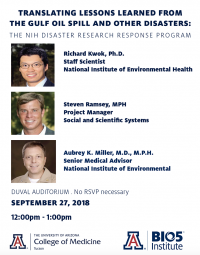DuVal Auditorium
1501 N. Campbell Ave.
Tucson, AZ
Join three experts from the National Institute of Environmental Health Sciences (NIEHS) for the free noon seminar, "Translating Lessons Learned from the Gulf Oil Spill and Other Disasters: The NIH Disaster Research Response Program."
Each environmental or man-made disaster presents unique challenges for studying potential health consequences. Nonetheless, valuable lessons from studying a single disaster can inform approaches following other disasters. The 2010 Gulf of Mexico Deepwater Horizon disaster created the largest marine oil spill in history. Individuals who worked on the clean-up of the spill were exposed to toxicants, stressors, and other environmental factors that could affect health. In 2011, the NIEHS initiated The GuLF STUDY (Gulf Long-term Follow-up Study) to investigate a wide range of chemical and non-chemical exposures and potential physical and mental health effects. The findings from the study may inform public health responses in Gulf communities and/or responses to future oil spills, as well as the lessons learned have already started to be translated to help researchers respond more quickly to public health data needs in future disasters and emerging threats through the National Institutes of Health (NIH) Disaster Research Response Program (DR2). The DR2 program has taken the lessons learned from past disasters and had developed tools, surveys, protocols, and other resources to help researchers be able to collect data more rapidly when a disaster happens to help inform the response and recovery, and better understand adverse health effects of disasters.
The seminar will be led by:
Richard Kwok, PhD, is a staff scientist in the Epidemiology Branch at NIEHS and is the Lead Associate Investigator for the GuLF STUDY. The study focuses on the potential health effects of clean-up workers, volunteers, and community members from the Deepwater Horizon disaster. Kwok specializes in the environmental causes of a range of diseases, and the pervasive nature of the environment in disease etiology has allowed him to work on a number of different projects with domestic and international collaborators from federal, academic, and industry sectors. His work has included research into air and water pollution, including arsenic, and non-ionizing UV radiation exposures with health outcomes such as cardiovascular, respiratory, reproductive and cancer. Kwok received his BSPH in environmental science, and his MSPH and PhD in epidemiology from the University of North Carolina at Chapel Hill.
Aubrey K. Miller, MD, MPH, Captain in the U.S. Public Health Service (USPHS), is currently the Senior Medical Advisor for the Director of the NIH's NIEHS. There he leads legislative, policy, and environmental health related programs and activities in coordination with other government, academic, and public stakeholders. He has longstanding experience, publications, presentations, and contributions to a wide variety of occupational and environmental health issues, including asbestos, disaster research, and numerous emergency responses across the U.S. His career includes notable public health positions with U.S. federal agencies, including the FDA, EPA, and CDC.
Steven Ramsey, MPH, has wealth of experience in the areas of public health preparedness, disaster response, and public health research. He leads the development of protocols for rapid collection of environmental, health and exposure data in response to environmental disasters. For the Gulf Long-term Follow-up Study, he managed field operations in five states; he is currently the Project Director for the NIEHS DR2 Program.
The seminar is sponsored by the College of Medicine - Tucson, Bio5 and the Mel and Enid Zuckerman College of Public Health.



